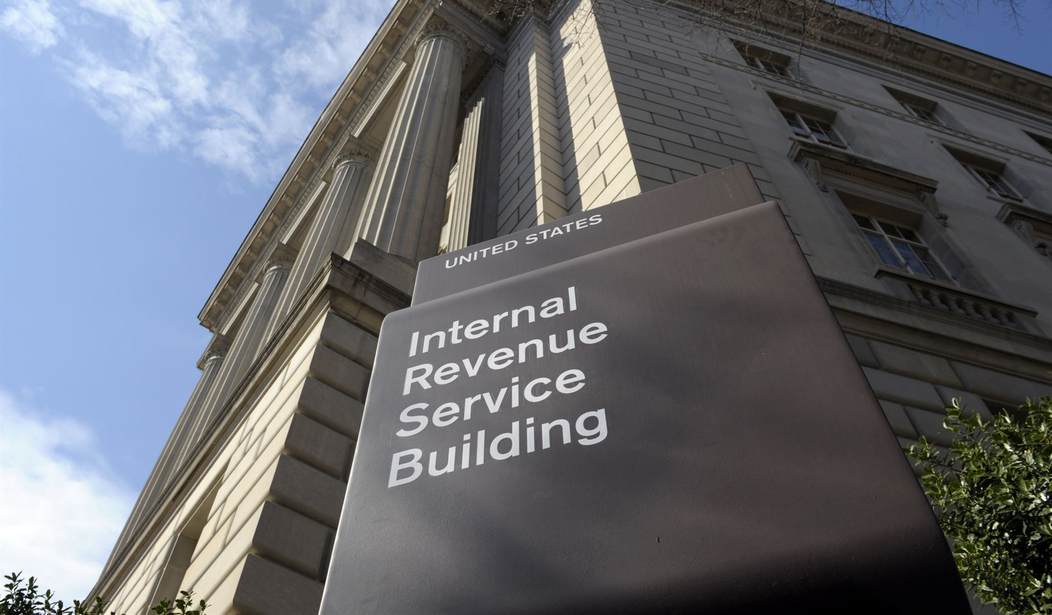In May, the Internal Revenue Service (IRS) appeared to resurrect its infamous targeting of conservative groups under President Barack Obama, but with a particularly terrifying twist — it denied a 501(c)(3) tax exemption to a Texas-based Christian group because its Bible-based Christian teachings “are typically affiliated with the [Republican] party and candidates.” On Wednesday, the IRS relented, belatedly granting the exemption but refusing to deliver an explanation or apology.
“Dear Applicant,” the form letter reads. “We’re pleased to tell you we determined you’re exempt from federal income tax under Internal Revenue Code (IRC) Section 501(c)(3).” The IRS sent the letter to the Texas-based group Christians Engaged along with its law firm, First Liberty Institute. First Liberty provided a copy of the letter to PJ Media.
The letter did not mention the previous denial and it did not offer an explanation or an apology. Even so, First Liberty and Christians Engaged celebrated the reversal.
Recommended: Washington Elites Are Weaponizing the Tax Code Against Christians
“This is truly great news for our client, as well as religious organizations and churches across America,” Lea Patterson, counsel for First Liberty Institute, said in a statement. “We are grateful the IRS changed course to bring its decision into line with the Constitution and its own regulations.”
“I am incredibly thankful to the IRS for doing the right thing, and we look forward to continuing our mission of educating more followers of Jesus to pray for our nation and to be civically engaged,” Christians Engaged President Bunni Pounds said. “When we stand up, our republic works for all Americans.”
While the IRS’s reversal is heartening, it may not allay the very serious concerns that IRS Exempt Organizations Director Stephen A. Martin raised when he denied the tax exemption in the first place.
In a letter on May 18, 2021, Martin denied Christians Engaged’s application, claiming that the Christian group “engage[s] in prohibited political campaign intervention” and “operate[s] for a substantial non-exempt private purpose and for the private interests of the [Republican] party.”
Most egregiously, Martin suggested that no Bible-based organization could be exempt from taxation. He wrote that Christians Engaged aims to “educate believers on national issues that are central to their belief in the Bible as the inerrant Word of God. Specifically, you educate Christians on what the Bible says in areas where they can be instrumental including the areas of sanctity of life, the definition of marriage, biblical justice, freedom of speech, defense, and borders and immigration, U.S. and Israel relations. The Bible teachings are typically affiliated with the [Republican] party and candidates. This disqualifies you from exemption under lRC Section 50I(c)(3).”
As First Liberty Institute noted in its appeal of the rejection, there is no requirement that tax-exempt organizations be neutral on public policy issues; Christians Engaged does not serve private, nonexempt purposes just because of its Christian worldview; and the rejection violated the First Amendment’s Free Speech, Free Exercise, and Establishment clauses through viewpoint discrimination and religious discrimination.
The reversal represents progress, but the fact that the IRS denied the application in the first place, coupled with the extreme claims the IRS used to engage in unconstitutional viewpoint discrimination, remains worrisome.
Under Obama, the IRS targeted tea party organizations for extra scrutiny and even denial of tax-exempt status. IRS officials long denied the partisan nature of their targeting, and many on the Left insist that the scandal never happened. Yet Martin’s original letter to Christians Engaged threatened something even more sinister than the IRS targeting scandal.
If the IRS claims that biblical values are tied to the GOP and therefore no biblical organization can have a tax-exempt status, what does that mean for churches?
At least one Democrat — Rep. Jared Huffman (D-Calif.) — has threatened to target the Roman Catholic Church’s tax-exempt status if the U.S. Conference of Catholic Bishops (USCCB) drafts rules on Communion that he doesn’t like.
“Unfortunately, the IRS seems to agree with Representative Huffman, as it demonstrated recently by denying a religious organization’s tax exemption because, as its letter stated, ‘[B]ible teachings are typically affiliated with the [Republican] party.’ But the tax code must not become a weapon for Washington elites to punish churches who hold religious beliefs they dislike,” Patterson, the First Liberty counsel, told PJ Media in June.
Other Democrats have also supported a similar weaponization of the tax code. In a congressional hearing in 2019, Democrats cited the far-Left scandal-plagued Southern Poverty Law Center (SPLC) in demanding that the IRS remove tax-exempt status from “hate groups.” The SPLC routinely brands mainstream conservative and Christian organizations “hate groups” due to their opposition to the Left’s narrative and activism on LGBT issues, Islam, and immigration.
In the wake of a scandal involving claims of racial discrimination and sexual harassment that saw the SPLC fire its co-founder and lose its president and legal director, a former SPLC employee outed the “hate-group list” as a “masterstroke of [the founder]’s marketing talents.” This seemed to confirm claims that the hate group list is a cynical fundraising scheme, rather than a legitimate report.
The “hate group” accusation also gives the SPLC a way to destroy its political enemies. Former SPLC spokesman Mark Potok also revealed an animus against the organizations on the list. He said the SPLC’s “aim in life” is to “destroy these groups.” In 2012, a deranged man targeted the Christian non-profit organization the Family Research Council (FRC), aiming to kill everyone in the building and smear a Chick-fil-A sandwich into his victims’ faces. He told the FBI he targeted FRC due to the SPLC’s “hate group” accusation. The SPLC has not dropped that accusation.
Recommended: Dems Endorse Anti-Christian SPLC Report: ‘It’s Time We Extinguish All Bigoted Beliefs’
Rep. Judy Chu (D-Calif.) led the fight against tax-exempt status for “hate groups,” and she recently led her fellow Democrats to publicly praise the SPLC’s recent “hate group” report.
In this climate, the IRS’s mere reversal seems insufficient. Martin owes Americans an explanation, and he owes biblical Christians an apology.
IRS letter granting tax-exempt status to Christians Engaged by PJ Media on Scribd









Join the conversation as a VIP Member